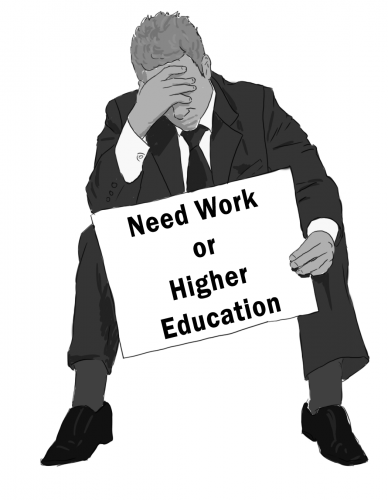15 Percent of U.S. Youth Not in Work or School
 DENISE TIEU
DENISE TIEU
News Editor
CINDY LUO
Staff Writer
Recently released results from research conducted by Opportunity Nation, a bipartisan, cross-sector national campaign, has shown that 15 percent of U.S. youth between the ages of 16 to 24 are neither in school nor at work. In addition, the study claims that this 15 percent will never be able to realize their full potential, will be unlikely to have high salaries and will drain public resources in the future.
“We know that engaged young adults can keep us from paying steep financial and social costs,” Opportunity Nation’s Executive Director Mark Edwards said, according to the Washington Times. “Young adults who are not in school or working cost taxpayers $93 billion annually and $1.6 trillion over their lifetimes in lost revenues and increased social services.”
According to the Bureau of Labor Statistics, the unemployment rate of Americans is now the lowest it has been since December 2008. One factor that is keeping the youth out of work is the economy. Since former employees get to keep their jobs, with last-in, first-out policies at many organizations and a preference at companies to freeze hiring before they start firing employees, the recession is particularly hard on inexperienced, untrained youth. The result is fewer opportunities on the lower end of the job ladder, which has kept the young adults on the sidelines.
“If you have two candidates for a job, and one has experience and will take $10 an hour, and the other is a teen with no experience, who do you think would get the job?” Renee Ward, founder of job posting site Teens4Hire said. “When jobs aren’t there for anyone, it’s that much harder.”
Numerous organizations aid young people in finding a job. For example, Year Up, a nonprofit organization that trains young adults for careers and aids them in the process of finding a job, spends a year teaming up with and teaching high school graduates necessary career skills, such as computer programming. Currently, an estimated amount of 4,500 U.S. youths from urban areas have completed Year Up, with 84 percent of the participants finding work afterwards.
A youth’s community also correlates with their success in life. Among the factors that impact the availability of opportunities in a state or community are Internet access, college graduation, income equality and public safety.
“Their destiny is too often determined by their ZIP code,” Year Up employee Charlie Mangiardi said, according to The Daily Cougar.
Young people are more likely to be successful in their job hunt if they have prior work experience. A recent study by High Fliers Research stated that graduates who have had no previous work experience at all are unlikely to be successful during the selection process and have little or no chance of receiving a job.
“Seeing how some jobs expect so much from one person really causes me to feel the need to join the working force,” senior Hoangoanh Nguyen said. “My intention of joining the workforce was to get great working experience and to build confidence in speaking to anyone and everyone without feeling judged or [having] the thought of being judged. The experience made me see that school is just something that […] helps one’s understanding of how to do anything.”
Most high school students are still finding their interests, and working experience can be a way to sample career options.
“[Working] is a valuable experience [that] helps you get a better understanding of how the system runs, it also helps you find out what you are really interested in,” ceramics teacher Jayson Pineda said. “If the job is not something you like or it’s not like what you are expecting, you can still learn important skills like how to communicate with others and how to handle different situations. It helps you grow.”